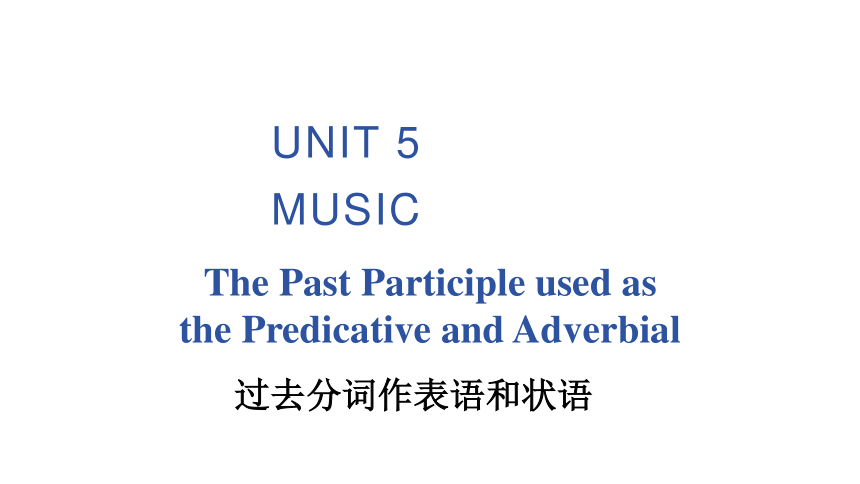(
课件网) UNIT 5 MUSIC The Past Participle used as the Predicative and Adverbial 过去分词作表语和状语 1. I like reading the novels _____ (write ) by Rao Xuanman. 2. The girl _____ (write) a letter in the study is my cousin. 3. My car has broken down and I have to get it _____ (repair). written writing repaired Revision Lead in 4. I want the doors of my new house _____ (paint) white. 5. There was a _____ (surprise) look on his face. 6. He was _____ (excite) at the good news. 7. The story was so_____(move) that he was _____(move) to tears. painted surprised excited moving moved The Past Participle (III) as adverbial 过去分词作作状语 Grammar Review (句子成份) ★ predicative 表语(系动词后) ★ object complement 宾语补足语 (动词+sth/sb 后) ★ attributive 定语(修饰名词) 1. _____ (污染的)air and water are harmful to people’s health. 2. The problem _____ (在会议上讨论的) yesterday was very difficult to solve. 3. He became _____ (兴奋) when he heard he had won the first place in the competition. 4. I am _____ (感兴趣) in the story. 5. His voice was so low that he couldn’t make himself _____(听见). 6. My computer was broken, I must have it _____ (修理). Polluted discussed at the meeting excited 定语 定语 interested heard repaired 表语 表语 宾补 宾补 完成句子并判断所做成分 表语 (Predicative) 表语位于 _____ 的_____,说明主语的状态或特征。 系动词 后面 如:They looked disappointed(失望的). She was astonished(惊讶的) to hear what had happened. 常见的系动词有哪些? 1.She was moved. 2.She seems surprised at the news. 3.They looked frightened to hear the frightening sound. 4.The door is closed. 过去分词可置于 后作 语,相当于形容词,用来表示主语的 。 tip1:其前的系动词包括be动词、感官动词feel、持续系动词(remain, stay, keep)、变化系动词(become, get, go)、表象系动词(seem, look, appear)、终止系动词(prove, turn out)等多种形式。(英语周报44期 p1) 系动词 表 状态 常见的系动词有: 1.状态系动词:be 动词; 2.感官系动词:look/ feel/ smell/ taste/ sound等; 3.变化系动词:get/ become/ turn/ grow/ fall/ grow等 4.持续系动词:remain/ stay/ keep(仍然) 5.表象系动词:seem/appear(似乎,好像) 6.终止系动词:prove/ turn out(结果是,证明是) The rumor proved (to be ) false. The plan turned out to be a success. V-ed作状语V-ed过去分词做状语,可表示时间、 原因、条件、让步、方式、伴随等意义,相当于一个时间、原因、条件、让步等状语从句。位置:通常放在主句之前或之后,用逗号与主句隔开V-ed分词(短语)作状语时,也可在其前面加上连词when, if, once, though, unless等,以便明确作何种状语。Summary 1:伴随条件时间让步原因主句之前主句之后过去分词作状语位置状语作用状语状语状语/方式状语=状语从句_____ trained at Mr. Higgins’ home, Eliza was encouraged to work hard. _____ given a six-month training, Eliza could pass herself off as a duchess at an Embassy ball. _____ touched by Mr. Higgins’ words, Eliza wanted to learn to speak standard English from Mr. Higgins. Eliza came into the room shyly, _____ followed by Mrs Pearce. _____ laughed at by Freddy, ... ...

